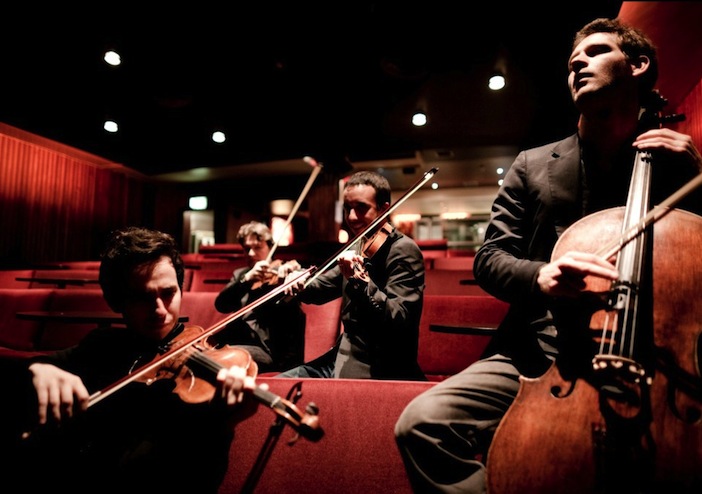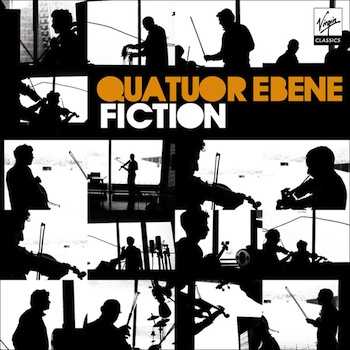Music Review: On Quatuor Ébène’s program — Mozart, Bartók and “Pulp Fiction.”
Quatuor Ébène burst into song. And I think it’s safe to say singing of any kind is almost never heard at a strings-only concert.
By Adeline Sire
Friday night’s performance by the French String Quartet Ébène (or “ebony”) at New England Conservatory’s Jordan Hall was one of the most inventive and versatile I’ve ever attended.
In the first half of the concert the musicians displayed great mastery of the standard string quartet repertoire and then spent the second half jamming with 20th century popular music, including jazz and soundtrack tunes. Throughout the evening, the ensemble showed remarkable ease switching between these genres.
And then, they burst into song. And I think it’s safe to say singing of any kind is almost never heard at a strings-only concert.
Quatuor Ébène’s program began with a meat-and-potato dish of the repertoire: Mozart’s String Quartet No. 16 in E-flat Major. From the start, all the musicians demonstrated great finesse handling the smallest details, their intentions perfectly clear all the way to the very tips of their bows, the piece’s dynamic changes perfectly synchronized. Yet they left room for surprising moments. First violinist Pierre Colombet played some of his melodic passages as if they were improvisations he was savoring for the first time. The overall sound of the piece was mellow, if at times some phrase endings were executed with a hint of a welcomed irony.
A jump to the 20th century propelled the audience into the fantastic Hungarian folk-modern world of Bartók with his String Quartet No. 3. Bartók’s skill for chords that project a sense of imminent danger created a radical change in atmosphere. Pizzicati seemed to narrate a story, glissandi, muted harmonics, and fifths – so prominent in Eastern European folk music – took the audience far from Mozart’s warm sphere into fearsome territory. In some fortissimo passages, the stabbing sound of those four bows reminded me of Bernard Herrmann’s soundtrack in Hitchcock’s film Psycho.
This group looked good in dark suits and matching pointy black shoes. But it’s their presentation that had the most panache: as soon as they ended a piece, they sprang to their feet and stepped behind their chairs to take bows.
Returning after the intermission, the musicians remained with 20th century music but abandoned the standard classical repertoire to throw in a jazzed-up jam session. The playbill tersely read: “’FICTION’: This portion of the program will be announced from the stage.” Fiction is the title of the crossover jazz and film music album the group released in 2012. They began with their lush arrangement of Errol Garner’s “Misty” whose theme came in after an elegant and winding introduction. “Nature Boy” came next. Raphaël Merlin played double-bass on his cello, first, plucking, then strumming, while Colombet played a swinging melody reminiscent of the style of the late French jazz great Stéphane Grappelli.
From the stage, Merlin explained that Ébène was invited to perform on television for a classical music awards show in France back in 2007. The theme that night was America. “So we’d expected to play something by Gershwin or Bernstein, or even a piece from Dvořák’s American string quartet,” Merlin said. “But no, they wanted Pulp Fiction. The show’s producers commissioned a string quartet version of “Misirlou,” a Greek folk tune better-known in Dick Dale’s 1962 surf rock version, which was brought back in the film Pulp Fiction. The group took the theme and came up with a whole new landscape for it, weaving in styles borrowed from Bartók’s folk to Astor Piazzola’s melancholic tango style, with a little Klezmer in between. Colombet, second violinist Gabriel Le Magadure, and violist Mathieu Herzog took turns with the theme, each bringing expressive solos to the piece. The musicians also played percussion, tapping their instruments, or bouncing their bows on strings with tight rhythm.
“I understand Boston is located in New England,” said Raphaël Merlin next. “So let’s bring up old England and a certain band from Liverpool.” He and his bandmates performed an inventive cover of The Beatles’ “Come Together,” with a full and raw wall of sound. For all the vertiginous virtuosity of their playing, Ébène’s musicians are not self-indulgently showy — rather subtle in both loud and soft ranges.
“Libertango,” by Argentinian tango master Piazzola came next, then a song from an ’80s French film, and Miles Davis’ “All Blues,” in which Merlin showed his chops playing bass again on the cello.
By then, Ébène had definitely proven their immense range, as solid and imaginative in classical as it is in jazz. The audience’s enthusiastic applause led to an encore. Merlin introduced the tune as “a little song from the Disney film Snow White,” and the quartet burst into an a cappella rendition of “Some Day My Prince Will Come,” in French. Violinist Le Magadure and violist Herzog carried the top melody with supple, high voices. The group sang two verses gracefully before returning the tune to their able strings. It was a sweet Barbershop style rendition, with well-tuned voices, assets just as fortuitous for string players as they are completely unnecessary to the fruitful life of a string quartet. But that was a “bonus track” that put a sparkle on an already shining performance.
What I would like to see Ébène’s musicians do in jazz is relax their playing, drop some of the romantic vibrato, and leave more room for solo improvisations.
Perhaps some of this flexibility will be found on their upcoming CD Brazil! which will be out next month. No classical pieces on this collaborative album, which is inspired by the music of Brazil and South America. On it, you will find percussion, guitars, and vocals surrounding the quartet. Jazz singer Stacey Kent and French singer-songwriter Bernard Lavilliers are two of the featured guests.
Quatuor Ébène debuted at Carnegie Hall last month (the group was presented here by the Celebrity Series of Boston), and is still touring North America. Catch them if you can.
Adeline Sire is an independent arts journalist and radio producer specializing in music and culture, in the Boston area. She is a contributor to the quarterly magazine Early Music America and is a former producer for the BBC/PRI/WGBH international news program The World. Adeline was a fellow of the USC Annenberg / Getty Arts Journalism Program in 2008, and a fellow of the NEA Arts Journalism Institute in Classical Music and Opera in 2009. Twitter: @AdelineSire


